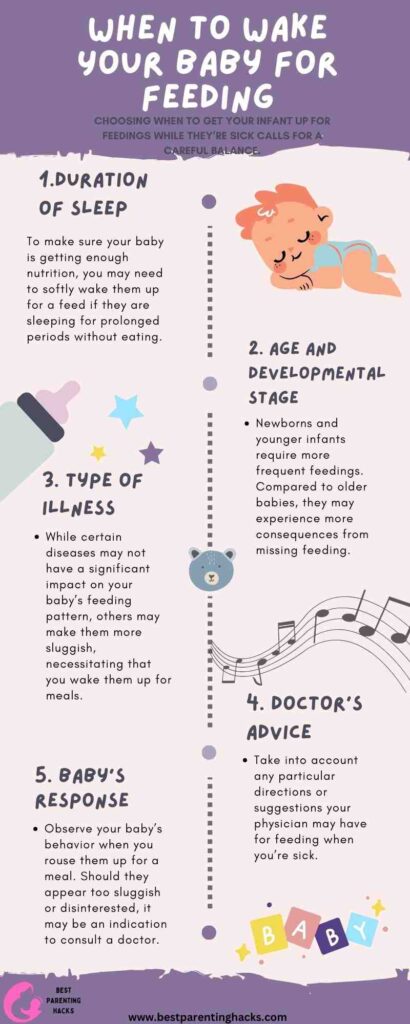Table of Contents
The health and welfare of our children is the first thing that parents think about all the time. When our children are sick, it may be a very stressful and uncertain time. Whether to wake our ill kid for feeding is one of the most frequent decisions we have to make during these times. This question frequently causes us to struggle between wanting to give them what they need and wanting to give them time to heal. I’ll dive into this complicated topic in this post and help you make these difficult decisions by utilizing both my own experience and expert guidance.
To directly address the issue in the headline, the answer is yes, you should think about waking up a sick infant for food, but only after carefully assessing their requirements and general state. When a baby is ill, their body fights the sickness with all of its might, and this demands energy from food and fluids. That being said, this does not imply you should wake them up without a reason. It’s about striking a balance, paying attention to your baby’s signs, and making judgments that are well-informed given their unique situation. The secret is to pay close attention to your baby’s requirements and respond to them gently so that they receive the nutrition they require without experiencing unnecessary stress or discomfort.

When to Wake Your Baby for Feeding
Choosing when to get your infant up for feedings while they’re sick calls for a careful balance. After determining their current situation, take into account the following five factors:
1. Duration of sleep: To make sure your baby is getting enough nutrition, you may need to softly wake them up for a feed if they are sleeping for prolonged periods without eating.
2. Age and Developmental Stage: Newborns and younger infants require more frequent feedings. Compared to older babies, they may experience more consequences from missing feeding.
3. Type of Illness: While certain diseases may not have a significant impact on your baby’s feeding pattern, others may make them more sluggish, necessitating that you wake them up for meals.
4. Doctor’s Advice: Take into account any particular directions or suggestions your physician may have for feeding when you’re sick.
5. Baby’s Response: Observe your baby’s behavior when you rouse them up for a meal. Should they appear too sluggish or disinterested, it may be an indication to consult a doctor.
You Might Also Like to Read: 5 Reasons that Baby Doesn’t Like Head Touched
Understanding Your Baby’s Needs When Sick
Your baby’s typical sleeping and feeding schedule may alter significantly while they’re ill. To give the finest care, it’s critical to be aware of these changes and comprehend them. Because the body naturally slumbers more when a baby is ill, or because they are uncomfortable and restless, they may not sleep according to their usual schedule. Either way, you need to be adaptable and sensitive in how you approach feeding.
1. Observe Sleep Patterns: Determine whether your infant is sleeping a little or a lot more than normal. A higher sleep pattern may indicate that the body is storing energy to combat the sickness.
2. Watch for Hunger Cues: Even if your baby stays asleep longer, you should still be alert for indications of hunger, including waking up throughout the night and making lip-smacking or sucking motions.
3. Consider the severity of Illness: Your baby’s feeding requirements and appetite may be impacted by the severity of their condition. They might not be too disturbed by a slight cold, but they might be by a more serious disease.
4. Maintain a Comfortable Environment: Make sure your infant is in a setting that is suitable for eating and sleeping. This might entail making sure the area is calm, employing a humidifier, or altering the temperature in the room.

The Importance of Hydration and Nutrition
When your infant is ill, diet and hydration are essential to their healing process. Here are five things to think about:
1. Hydration is Key: Infants who have diarrhea or fever are more susceptible to dehydration. Regularly give your infant breast milk, formula, or, if they are older, small quantities of water.
2. Energy Needs: The vitamins and minerals in their meals provide your baby’s body with the energy it needs to fend against the disease. The quality of the meal is important, even if they consume less than normal.
3. Digestive Comfort: If your infant is undergoing gastrointestinal distress, choose foods that are gentle on their stomach. Basic, flavorless meals may be more enticing and less likely to make you uncomfortable.
4. Feeding Frequency: A sick baby might not have the energy or hunger for their typical feeding volume, so you could find yourself feeding them more often but in lesser quantities.
5. Monitoring Intake: Observe how much food and liquids your infant is consuming. This might assist you in identifying any notable changes that may call for medical intervention.
You Might Also Like to Read: I Accidentally Got Saline Drops in My Baby’s Eye

Comforting Your Sick Baby
It is just as crucial to soothe a sick infant as it is to feed them. To make sure your infant feels cherished and soothed, follow these four steps:
1. Physical Comfort: Give your infant a little massage, rock them softly, or hold them close. For a sick infant, physical touch may be quite comforting.
2. Soothing environment: Establish a serene setting. Your infant can be soothed by white noise, soft lighting, or soft music.
3. Emotional Reassurance: Talk to your child in a soothing, quiet voice. Your voice and presence may be a wonderful consolation.
4. Gentle Feeding: Be especially careful while feeding your sick baby. Give them time and exercise patience.
Monitoring and Seeking Medical Advice
It’s important to keep an eye on your ill baby’s condition and to know when to get medical help. Here are some things to remember:
• Track Symptoms: Pay special attention to your infant’s symptoms. Make a note of any alterations or getting worse.
• Feeding and Hydration: Keep an eye on their water and food intake. Reluctance to eat or significant changes can be cause for concern.
• Fever Management: Monitor their body temperature. A persistently high temperature may need to be treated medically.
• Behavioral Changes: Pay close attention to any adjustments in your baby’s demeanor or degree of activity. Irritability or lethargy may be cause for worry.
• Trust Your Instincts: You are the parent who knows your child the best. Do not hesitate to get in touch with your doctor if something seems strange.

Conclusion
In summary, this debate has shown that waking a sick infant for feeding is a complex decision that depends on several variables. Since every infant is different, what suits one may not suit another. The secret is to approach things with flexibility, responsiveness, and observation. Recall that your main objective is to aid in your baby’s recuperation, which includes making sure they get enough food and fluids, even if it necessitates waking them up from time to time for feedings.
Though it’s common for parents to stress about doing the “right” thing, it’s crucial to keep in mind that our instincts and our love for our children frequently lead the way. Don’t be afraid to ask for help from family, friends, and medical experts during these trying times. Your child’s health and welfare are very important, and the greatest thing you can do is make thoughtful, compassionate decisions. Keep in mind that this stage is just brief, and with your love and care, your child will return to being happy and active in no time.
FAQs
1. How frequently should I feed my sick baby? – Generally, feed them every couple of hours, even if it’s in smaller portions than normal. This depends on their age and regular feeding pattern.
2. What symptoms could a newborn have of dehydration?
• Less wet cloth diapers, dry mouth, lack of tears when sobbing, and lethargic behavior are typical indicators.
3. When my child is ill, should I alter their diet?
• Adhere to their usual diet, however, you may need to feed them smaller meals more frequently.
4. How can I make sure my child resumes their normal schedule after being ill?
• As they heal, progressively return to their regular habits and schedule.
5. Is a baby’s increased slumber during illness normal?
• Indeed, getting more sleep aids in the body’s defense against the sickness.
6. Is it okay to medicate my infant to lower their temperature before feeding them?
It is best to speak with your physician before giving any medicine.
7. What should I do if my sick baby won’t eat?
• Offer food to them when they appear to be the most attentive, and if the problem continues, contact a pediatrician.




